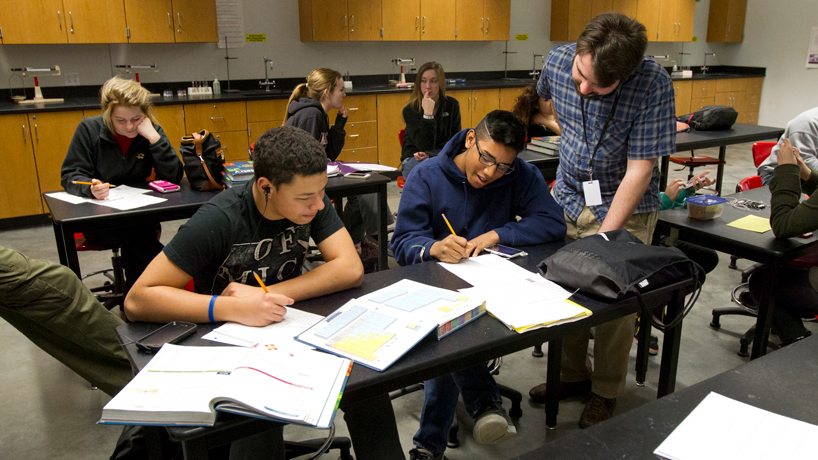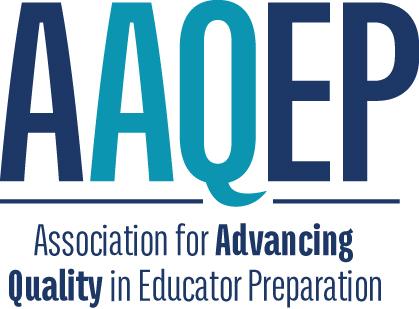
UMSL students can get the training and certification they need by earning a BSEd or through alternative certification routes such as the Teach in 12 or Teach Residency Programs. (Photo by August Jennewein)
The University of Missouri–St. Louis’ College of Education plays a leading role in educating and certifying many of the teachers leading classrooms across the St. Louis region.
The Association for Advancing Quality in Educator Preparation reaffirmed the quality of UMSL’s teacher preparation when it awarded the full seven-year accreditation to the College of Education’s initial teacher certification programs.
 “Congratulations to the University of Missouri – St. Louis and to all of the faculty, staff and stakeholders who have achieved their goal of national accreditation by AAQEP,” AAQEP President and CEO Mark LaCelle-Peterson said. “The program’s community engagement, particularly its work with community colleges to support access to the teaching profession, provides a model, as does its detailed attention to strengthening assessments to support improvement.”
“Congratulations to the University of Missouri – St. Louis and to all of the faculty, staff and stakeholders who have achieved their goal of national accreditation by AAQEP,” AAQEP President and CEO Mark LaCelle-Peterson said. “The program’s community engagement, particularly its work with community colleges to support access to the teaching profession, provides a model, as does its detailed attention to strengthening assessments to support improvement.”
UMSL also maintains accreditation from the Missouri Department of Elementary and Secondary Education for its educator preparation programs, but Associate Dean and Director of Teacher Education Nancy Singer said it was valuable to have UMSL’s programs scrutinized by the national accrediting agency.
“It’s always a healthy thing to have others who do this work in other contexts give you advice and feedback on your program,” she said. “If you just keep looking at yourself in the state of Missouri and talking to your colleagues, you don’t ever get that external look. That’s what this national accrediting does. It’s another way to review and ensure that we’re preparing high quality educators for the field.”
National accreditation is meant to assure the quality of professional preparation programs through a nongovernmental, nonregulatory process of self-study and peer review. The process promotes accountability and continuous improvement. The AAQEP model is also designed to honor local context and foster innovation and collaboration among institutions. AAQEP currently has members in 27 states and territories with over 160 educator preparation providers participating in the accreditation system.
UMSL students can get the training and certification they need for the classroom by earning a Bachelor of Science in Education or, if they already have a bachelor’s degree in another field, they can earn an accelerated certification through UMSL alternative certification routes such as the Teach in 12 Program or the Teach Residency Program.
About half of the teacher education students in the College of Education are returning to college for teacher certification. Many of them have accrued valuable life experiences in other areas that they’ll take with them to the classroom.
The lengthy accreditation process, which Singer led, gave administrators an opportunity to take a critical look at all of UMSL’s initial teaching certification programs, making sure that the would-be teachers who complete them are equipped with the tools necessary to serve their students.
“The whole process of looking at that data and writing up that accreditation helps us to identify our own areas that we need to improve upon and to set goals for ourselves,” Singer said.
She believes the field experience aspiring teachers receive at UMSL is one thing that set it apart from so many other institutions, and it provides them with a clearer understanding of what students need to learn before they step into their own classrooms.
“Some of our early and mid-level field experiences are completed in community agencies and not schools,” she said. “Children learn everywhere they are, not just in the school building. When teacher candidates see children in their communities, they learn something different about their needs. In our preparation program, we have students who fulfill field requirements by volunteering in a variety of settings.
“I think that’s unique to our educator preparation program and really gives our candidates an edge on the kinds of things that children face broadly,” she said.
That’s especially true because the overwhelming majority of College of Education graduates, like UMSL many graduates in other fields, tend to remain in the St. Louis region, where they’ve already done their student teaching.
Strong teacher preparation is critical at a time when schools around the country are faced with a shortage of qualified teachers.
“If nothing else, the pandemic has demonstrated to us that you need real, live human beings in the classroom,” Singer said. “It’s not the computer program. It’s not the textbook. It’s the teacher in front of the classroom who’s interacting with children that is the necessary component to effective teaching.”














